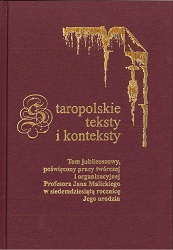Grzechy, posty i bankiety a zdrowie fizyczne i duchowe siedemnastowiecznego sarmaty na podstawie tomów poetyckich Daniela Bratkowskiego (1697) i Hiacynta Przetockiego (1653)
Sins, fasting and feasts and their influence on the physical and spiritual wellbeing of a 17th‑century sarmatian on the basis of poetry volumes by Daniel Bratkowski (1697) and Hiacynt Przetocki (1653)
Author(s): Teresa Banaś-Korniak
Subject(s): Christian Theology and Religion, Language and Literature Studies, Studies of Literature, Polish Literature, Theory of Literature
Published by: Wydawnictwo Uniwersytetu Śląskiego
Keywords: Old‑Polish literature; Baroque epigram; Daniel Bratkowski; Hiacynt Przetocki
Summary/Abstract: The aim of the article is to discuss the topic of physical and spiritual wellbeing as manifested in the works of two Baroque poets. Daniel Bratkowski, the author of the first volume, entitled „A World Partially Forgiven”, came from Volhynia and was a member of the Eastern Orthodox Church. Hiacynt Przetocki, in turn, the author of the volume entitled „A Fast‑day Dinner, or Trifle”, came from Greater Poland and was a Jesuit. In Bratkowski’s poetry, who focused particularly on spiritual wellbeing, his ruminations on the condition of a nobleman, his sins and his vices, were concentrated around social, political and eschatological matters. Hiacynt Przetocki, in turn, in his overview of various fast‑day dishes popular in his times, approaches the subject matter of the everyday life in a less serious manner, pointing to the beneficial properties of particular dishes and the harmfulness of others. Bratkowski, then, seems to be a greater malcontent and a more severe judge of his contemporaries than Przetocki. Nonetheless, both volumes constitute valuable sources of information regarding the mindsets, proclivities and sins of Polish nobility of the 17th century.
- Page Range: 29-44
- Page Count: 16
- Publication Year: 2018
- Language: Polish
- Content File-PDF

